
views
Diagnosing the Cause of Blurry Vision

Make sure you are wearing the correct glasses prescription. Most often, blurry vision is the result of an incorrect glasses or contact prescription. If your last ophthalmologist appointment was a year or two ago, it might be time to go back and get an updated prescription. If you keep glasses with old prescriptions around, make sure you aren't wearing those.
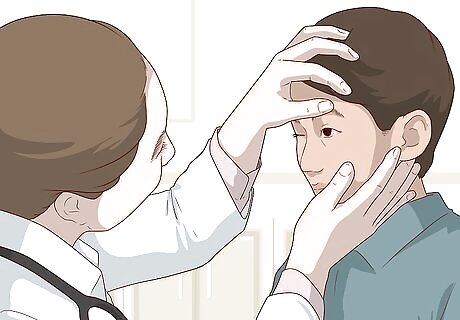
See a doctor to check for an eye infection if you have symptoms. Pink eye is one of the most common eye infections that can cause blurry vision, but other infections can cause similar symptoms. You may notice redness, itchiness, a gritty feeling, or discharge if you have an infection. If you notice any of these symptoms along with blurry vision, see your doctor as soon as possible. Since conjunctivitis is viral, the only treatment for this condition is good eye hygiene and using eye drops. If you wear contact lenses, stop as soon as you notice the symptoms of an eye infection. Eye infections are more common in contact lens wearers. It’s also important to prevent the spread, such as by washing your hands frequently and not sharing any tools or products that you use on your eyes, such as washcloths or eye makeup. Dry eye can also contribute to blurry vision.
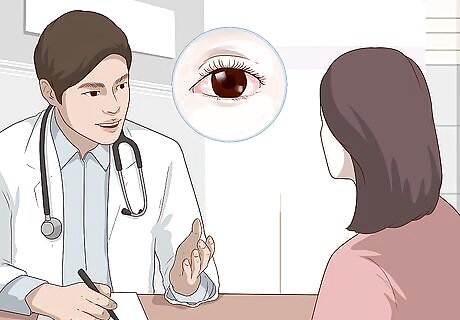
Visit an eye doctor yearly to check for more serious eye problems. Blurry vision can occasionally be a symptom of serious conditions like cataracts, corneal ulcers, or glaucoma. Visiting your eye doctor regularly can help you monitor your health and catch serious conditions early. Tell your doctor about all of the symptoms you are experiencing.

See your doctor to find and treat any underlying conditions. Sometimes, blurry vision is caused by a condition such as high blood sugar that can be managed with lifestyle changes, such as exercising more or changing your diet. Other times, you may need medication to treat a serious condition like diabetes or high blood pressure. They may also want to check your fasting blood sugar level or A1C. Sometimes a condition needs to be treated with a combination of lifestyle changes and medication. Work with your doctor to come up with a treatment plan. You might notice blurry vision if you have a fever, or you get fatigued or dehydrated.
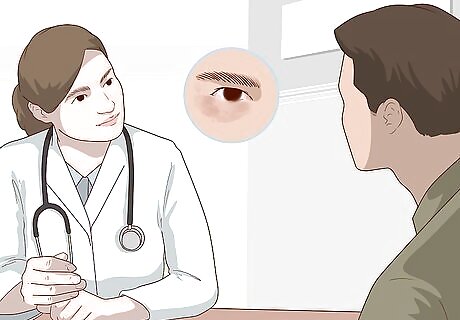
Go to a doctor right away if you experience blurry vision after an injury. If you have a black eye or another injury that causes blurry vision, see a doctor as soon as you can. This can sometimes be a sign of a serious injury. See your doctor as soon as you can after your injury, especially if you experience fluctuating vision, floaters, loss of side vision, or double vision in addition to blurriness.
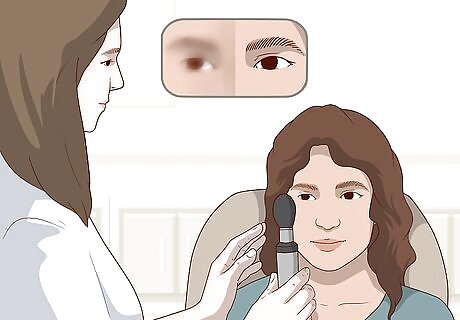
Get medical attention immediately if you have blurry vision in one eye. If you have blurry vision in only one eye that comes on suddenly, this could be a sign of diabetes, a stroke, migraine, psoriasis, multiple sclerosis, a brain tumor, or Parkinson's disease. It's safest to see a doctor as soon as you notice blurriness in one eye to catch any potentially serious conditions.
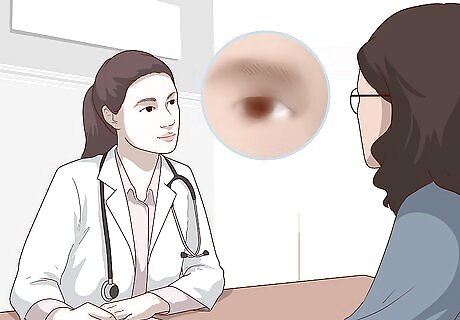
See your doctor for a follow-up if your blurry vision persists. Usually, blurry vision simply means you need an updated glasses or contact prescription, or you may need to start wearing reading glasses. However, if you've updated your prescription and followed your doctor's advice and you are still experiencing blurry vision, make a follow-up appointment as soon as you can. Blurry vision usually isn't a sign of anything serious, but it can be uncomfortable. It's best to see a doctor sooner rather than later if your vision is persistently blurry.
Treating Blurry Vision at Home

Wear reading glasses if you have trouble seeing things up close. If you notice that you experience blurry vision when you are reading or looking at screens up close, you might need reading glasses. Most adults will discover they need reading glasses between ages 40 and 60. Alternatively, you may need to consider bifocals.
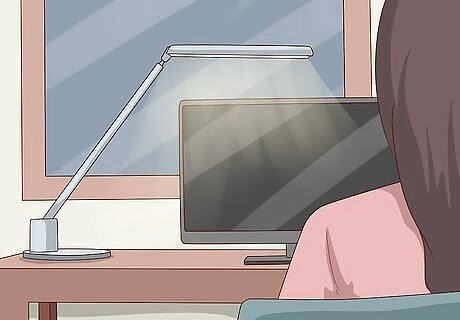
Make sure your work space is well-lit. If you have trouble with blurry vision when reading or working on the computer, adding more light can help. Add a desk or floor lamp to your work area to reduce strain on your eyes. Adding lighting can help, but you may also need to wear reading glasses or bifocals to completely get rid of blurry vision.
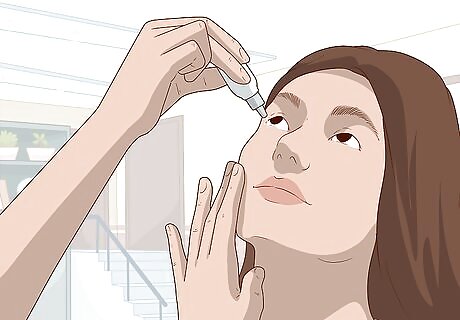
Use artificial tears to lubricate your eyes if they are dry. Dry eyes can sometimes cause blurry vision. Use over-the-counter eyedrops, following the directions that come with them to use them correctly. See a doctor if your dry eyes become painful or if your symptoms persist even after using eyedrops. With most eye drops, avoid using them more than 4 times a day.

Give your eyes a break from reading and screens. Use the 20-20-20 rule throughout the day, particularly if you work at a computer. Every 20 minutes look at something 20 feet (6.1 m) away for 20 seconds. This takes the strain off of your eyes. Taking strain off of your eyes helps prevent blurriness from fatigue.
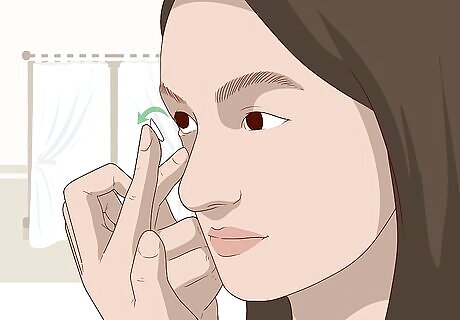
Take contact lenses out before you go to sleep and clean them properly. Sleeping with your contacts in can trap bacteria between the lenses and your eye and cause an infection and blurry vision. Clean your lenses with contact solution and store them in a case after taking them out. Never wear contacts for longer than they were made to be worn. For example, if your contacts are made for weekly wear, throw them out after wearing them for 7 days. Alternatively, consider daily contact lenses, which you discard after 1 wear. Make sure to take them out before going to sleep.

Manage your blood sugar levels if you have diabetes. Diabetes leads to fluctuations in your blood sugar, which can actually affect your vision. To manage your diabetes, track what you eat, your blood sugar levels, and any symptoms you notice. Avoid saturated fat, trans fat, sugar, and salt and look for foods that are lower in calories. Drink water rather than soda or juice, and avoid alcohol. Work with your doctor or a nutritionist to come up with a plant that works for you. Try having a piece of fruit for a sweet treat instead of candy or pastry.
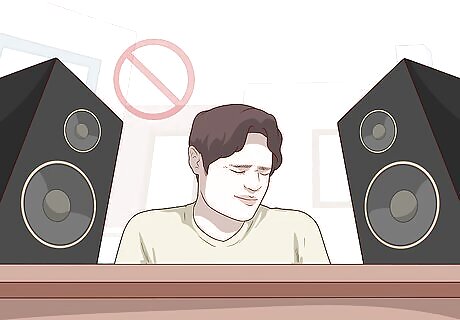
Stay away from migraine triggers, if you get frequent migraines. You may notice that blurry vision comes hand in hand with migraines. If you notice this pattern, pay attention to any triggers that seem to cause migraines, such as dehydration, low blood sugar, specific foods, bright light, or loud noises. If you have chronic migraines, you may need to work with a doctor on a treatment plan including medication. See a neurologist for a workup if you often experience headaches, double vision, or ringing in your ears. These could be signs of pseudotumor cerebra or increased intracranial pressure.
















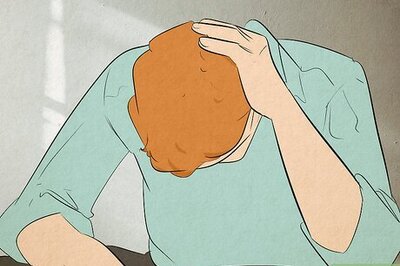
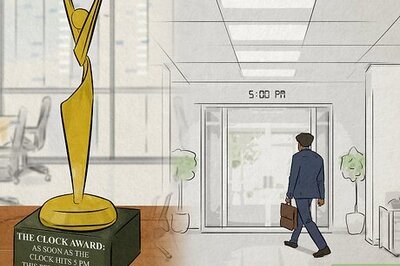
Comments
0 comment